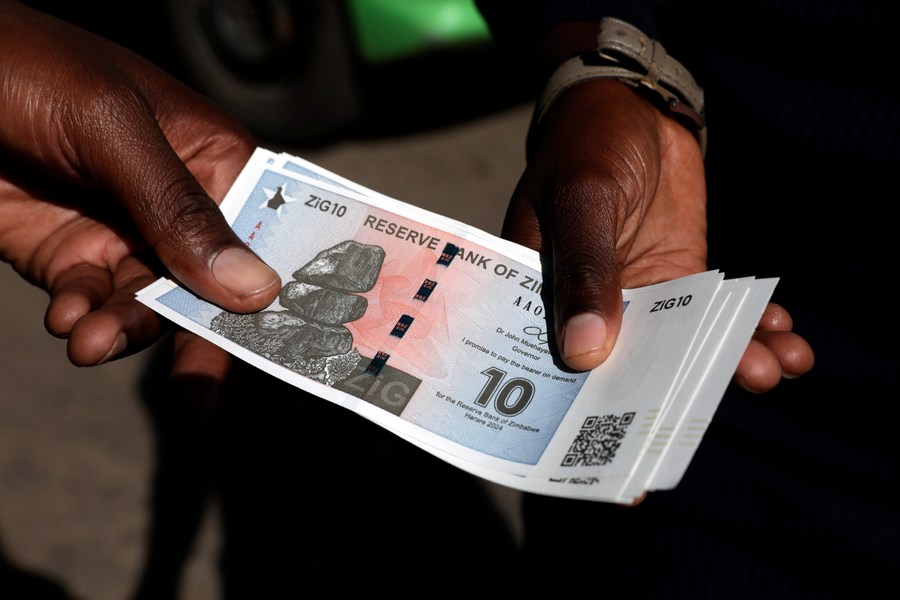Rocky road ahead for the ZiG
US dollar expected to remain dominant despite efforts to promote the new gold-backed currency in Zimbabwe
 Photo credit: Shaun Jusa/Xinhua
Photo credit: Shaun Jusa/Xinhua
Two months after Zimbabwe introduced a new gold-backed currency, the ZiG, is still struggling to gain public trust. To enforce the official exchange rate, the government has started imposing fines and arresting those who do not comply.
The ZiG, abbreviated from Zimbabwe Gold, was introduced on 5 Apr as a replacement for the Zimbabwean dollar, which had lost over 70% of its value this year. This new unit is backed by 2.5 tonnes of gold and approximately US$100m in foreign currency reserves held by the central bank. It marks the Southern African republic’s sixth attempt to establish a stable local currency.
While the new currency has roughly maintained its value of around 13 ZiGs to the US dollar on the official market, it has significantly depreciated on the black market, where US$1 has been exchanged for as much as 20 ZiGs. Shops and merchants often ignore the official rate and only accept the local currency at their own rates. Many vendors, particularly in the informal sector, still only accept the US dollar, which remains legal tender.
In early May, Finance Minister Mthuli Ncube announced that businesses would face a 200,000 ZiG (about US$15,000) fine for using an exchange rate higher than the official rate, which is set daily by the Reserve Bank of Zimbabwe. The police force, the Reserve Bank’s Financial Intelligence Unit, and the Zimbabwe Anti-Corruption Commission are all conducting separate operations to prop up the use of the ZiG. Over 200 street currency dealers have been arrested for violating foreign exchange regulations, and bank accounts of businesses not using the official exchange rate have been frozen. For example, just weeks after the currency's launch, two young brothers were arrested for allegedly selling US$10 worth of mobile airtime to undercover detectives at an elevated rate of 15 ZiGs per US dollar.
Reacting to the recent clampdown, Zimbabwe's street currency traders, a feature of the urban environment for many years, have shifted their activities underground. They have adapted by using social media and messaging apps like WhatsApp to conduct their transactions with customers.
At the height of the hyperinflation in 2008, a 100 trillion Zimbabwean dollar note (worth US$0.30 at the time) could barely buy a loaf of bread. Zimbabweans were forced to abandon their currency and adopt the US dollar – which still remains widely used. The government eventually suspended the use of its currency in 2009 and adopted a multicurrency system where currencies like the United States (US) dollar, South African rand and Botswana pula were used for transactions.
Meanwhile, Zimbabwe is continuing with a multi-currency system while promoting the new ZiG. President Emmerson Mnangagwa's administration aims to maintain this regime until 2030, at which point it hopes to transition to a single currency. However, this strategy has complicated the ZiG's introduction.
Economists say state coercion is unlikely to boost trust in the ZiG and the widespread use of US dollar is likely to continue unless confidence returns in the market. Zimbabwe was once a top exporter of tobacco, wheat and maize and dubbed the ‘bread basket’ of Africa. Mismanagement has now made it something of an economic basket case, with most households unable to obtain enough food to meet basic needs.
References
‘2024 Monetary Policy Statement’, Reserve Bank of Zimbabwe, 05 April 2024
‘Zimbabwe launches new gold-backed currency - ZiG’, BBC, 05 April 2024
‘Zimbabwe crafts plans to enforce usage of its new ZiG currency’, Semafor Africa, 09 May 2024
‘Zimbabwe to fine companies not using the official ZiG FX rate’, Bloomberg, 09 May 2024
‘Zimbabwe to fine businesses not using official new exchange rate’, Reuters, 10 May 10 2024
‘Zimbabwe unleashes police, intelligence services on people rejecting new ZiG currency’, News24, 16 May 2024
‘The ZiG: Zimbabwe rolls out world’s newest currency. Here’s what to know’, World Economic Forum, 17 May 2024
‘Zimbabwe authorities mix charm with force in an attempt to shore up the world’s newest currency’, New Zimbabwe, 27 May 2024














/enri-thumbnails/careeropportunities1f0caf1c-a12d-479c-be7c-3c04e085c617.tmb-mega-menu.jpg?Culture=en&sfvrsn=d7261e3b_1)

/cradle-thumbnails/research-capabilities1516d0ba63aa44f0b4ee77a8c05263b2.tmb-mega-menu.jpg?Culture=en&sfvrsn=1bc94f8_1)







